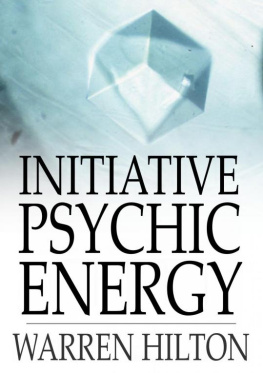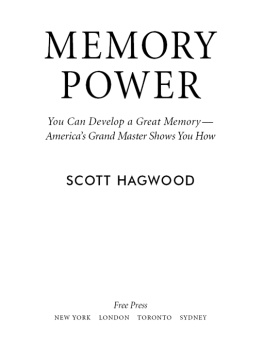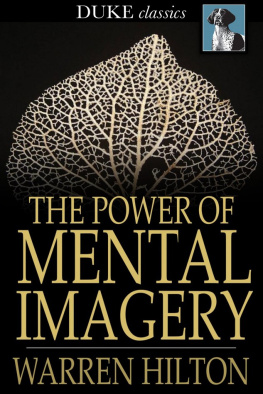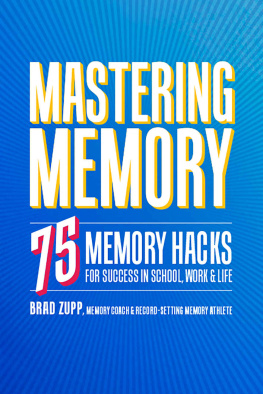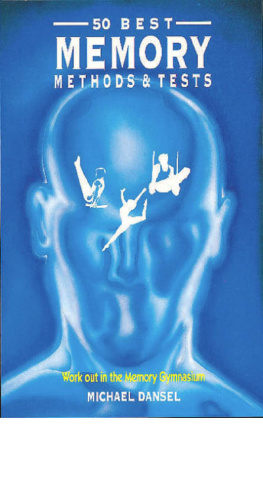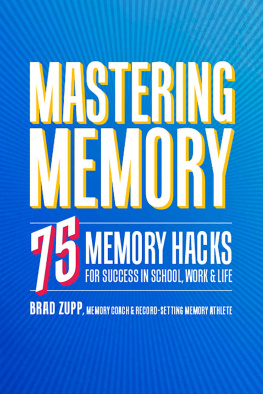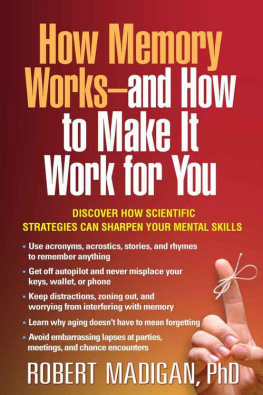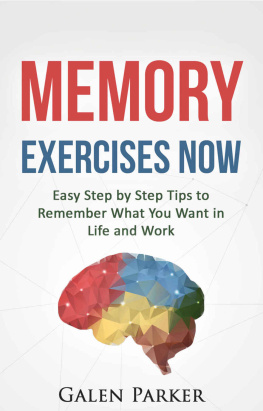Hilton - The Trained Memory
Here you can read online Hilton - The Trained Memory full text of the book (entire story) in english for free. Download pdf and epub, get meaning, cover and reviews about this ebook. year: 2015, publisher: Duke Classics, genre: Religion. Description of the work, (preface) as well as reviews are available. Best literature library LitArk.com created for fans of good reading and offers a wide selection of genres:
Romance novel
Science fiction
Adventure
Detective
Science
History
Home and family
Prose
Art
Politics
Computer
Non-fiction
Religion
Business
Children
Humor
Choose a favorite category and find really read worthwhile books. Enjoy immersion in the world of imagination, feel the emotions of the characters or learn something new for yourself, make an fascinating discovery.
The Trained Memory: summary, description and annotation
We offer to read an annotation, description, summary or preface (depends on what the author of the book "The Trained Memory" wrote himself). If you haven't found the necessary information about the book — write in the comments, we will try to find it.
The Trained Memory — read online for free the complete book (whole text) full work
Below is the text of the book, divided by pages. System saving the place of the last page read, allows you to conveniently read the book "The Trained Memory" online for free, without having to search again every time where you left off. Put a bookmark, and you can go to the page where you finished reading at any time.
Font size:
Interval:
Bookmark:

First published in 1914
ISBN 978-1-62011-555-8
Duke Classics
2012 Duke Classics and its licensors. All rights reserved.
While every effort has been used to ensure the accuracy and reliability of the information contained in this edition, Duke Classics does not assume liability or responsibility for any errors or omissions in this book. Duke Classics does not accept responsibility for loss suffered as a result of reliance upon the accuracy or currency of information contained in this book.
Being the Fourth of a Series of Twelve Volumes on the Applications ofPsychology to the Problems of Personal and Business Efficiency
BY
WARREN HILTON, A.B., L.L.B.FOUNDER OF THE SOCIETY OF APPLIED PSYCHOLOGY
ISSUED UNDER THE AUSPICES OF THE LITERARY DIGEST
FOR
The Society of Applied PsychologyNEW YORK AND LONDON1920
COPYRIGHT 1914BY THE APPLIED PSYCHOLOGY PRESSSAN FRANCISCO
Four Special Memory Processes
You have learned of the sense-perceptive and judicial processes by whichyour mind acquires its knowledge of the outside world. You come now to astudy of the phenomenon of memory, the instrument by which your mindretains and makes use of its knowledge, the agency that has power toresurrect the buried past or power to enfold us in a Paradise of dreamsmore perfect than reality.
In the broadest sense, memory is the faculty of the mind by which we(1) retain, (2) recall, (3) picture to the mind's eye, and (4)recognize past experiences.
Memory involves, therefore, four elements, Retention, Recall,Imagination and Recognition.
What Everyone Thinks
Almost everyone seems to think that we retain in the mind only thosethings that we can voluntarily recall; that memory, in other words, islimited to the power of voluntary reproduction.
This is a profound error. It is an inexcusable error. The daily papersare constantly reporting cases of the lapse and restoration of memorythat contain all the elements of underlying truth on this subject.
Causes of Forgetfulness
It is plain enough that the memory seems decidedly limited in itsscope. This is because our power of voluntary recall is decidedlylimited.
But it does not follow simply because we are without the power todeliberately recall certain experiences that all mental trace of thoseexperiences is lost to us.
Those experiences that we are unable to recall are those that wedisregarded when they occurred because they possessed no specialinterest for us. They are there, but no mental associations orconnections with power to awaken them have arisen in consciousness.
Seeing with "Half an Eye"
Things are continually happening all around us that we see with but"half an eye." They are in the "fringe" of consciousness, and wedeliberately ignore them. Many more things come to us in the form ofsense-impressions that clamorously assail our sense-organs, but noeffort of the will is needed to ignore them. We are absolutelyimpervious to them and unconscious of them because by the selection ofour life interests we have closed the doors against them.
In either case, whether in the "fringe" of consciousness or entirelyoutside of consciousness, these unperceived sensations will be found tobe sensory images that have no connection with the present subject ofthought. They therefore attract, and we spare them, no part of ourattention.
Just as each of our individual sense-organs selects from the multitudeof ether vibrations constantly beating upon the surface of the body onlythose waves to the velocity of which it is attuned, so each one of us asan integral personality selects from the stream of sensory experiencesonly those particular objects of attention that are in some way relatedto the present or habitual trend of thought.
The Man on Broadway
Just consider for a moment the countless number and variety ofimpressions that assail the eye and ear of the New Yorker who walks downBroadway in a busy hour of the day. Yet to how few of these does he paythe slightest attention. He is in the midst of a cataclysm of soundalmost equal to the roar of Niagara and he does not know it.
Observe how many objects are right now in the corner of your mind's eyeas being within the scope of your vision while your entire attention isapparently absorbed in these lines. You see these other things, and youcan look back and realize that you have seen them, but you were notaware of them at the time.
Let two individuals of contrary tastes take a day's outing together.Both may have during the day practically identical sensory images; buteach one will come back with an entirely different tale to tell of theday's adventures.
Waxen Tablets
All sensory impressions, somehow or other, leave their faint impress onthe waxen tablets of the mind. Few are or can be voluntarily recalled.
Just where and how memories are retained is a mystery. There aretheories that represent sensory experiences as actual physiological"impressions" on the cells of the brain. They are, however, nothing buttheories, and the manner in which the brain, as the organ of the mind,keeps its record of sensory experiences has never been discovered.Microscopic anatomy has never reached the point where it could identifya particular "idea" with any one "cell" or other part of the brain.
Not How, but How Much
For us, the important question is not how, but how much; not themanner in which, but the extent to which, sensory impressions arepreserved. Now, all the evidences indicate that absolutely everyimpression received upon the sensorium is indelibly recorded in themind's substance. A few instances will serve to illustrate theremarkable power of retention of the human mind.
Sir William Hamilton quotes the following from Coleridge's "LiterariaBiographia": "A young woman of four- or five-and-twenty, who couldneither read nor write, was seized with a nervous fever, during which,according to the asseverations of all the priests and monks of theneighborhood, she became 'possessed,' and, as it appeared, by a verylearned devil. She continued incessantly talking Latin, Greek and Hebrewin very pompous tones, and with most distinct enunciation. Sheets fullof her ravings were taken down from her own mouth, and were found toconsist of sentences coherent and intelligible each for itself but withlittle or no connection with each other. Of the Hebrew, a small portiononly could be traced to the Bible; the remainder seemed to be in theRabbinical dialect."
Remembering the Unperceived
The case was investigated by a physician, who learned that the girl hadbeen a waif and had been taken in charge by a Protestant clergyman whenshe was nine years old and brought up as his servant. This clergyman hadfor years been in the habit of walking up and down a passage of hishouse into which the kitchen door opened and at the same time reading tohimself in a loud voice from his favorite book. A considerable number ofthese books were still in the possession of his niece, who told thephysician that her uncle had been a very learned man and an accomplishedstudent of Hebrew. Among the books were found a collection of Rabbinicalwritings, together with several of the Greek and Latin fathers; and thephysician succeeded in identifying so many passages in these books withthose taken down at the bed-side of the young woman that there could beno doubt as to the true origin of her learned ravings.
Font size:
Interval:
Bookmark:
Similar books «The Trained Memory»
Look at similar books to The Trained Memory. We have selected literature similar in name and meaning in the hope of providing readers with more options to find new, interesting, not yet read works.
Discussion, reviews of the book The Trained Memory and just readers' own opinions. Leave your comments, write what you think about the work, its meaning or the main characters. Specify what exactly you liked and what you didn't like, and why you think so.






